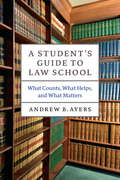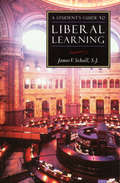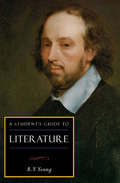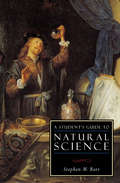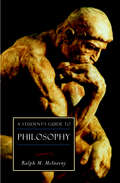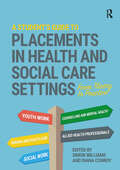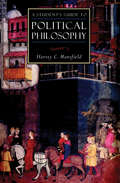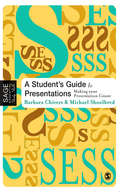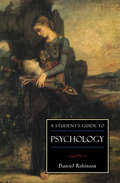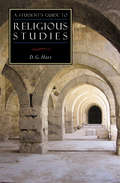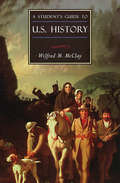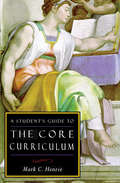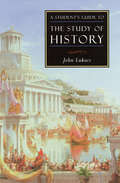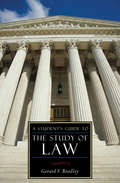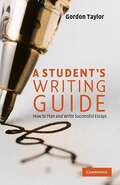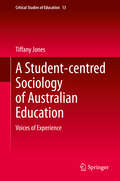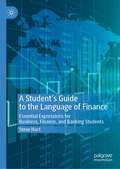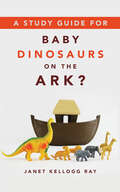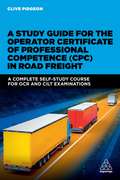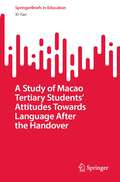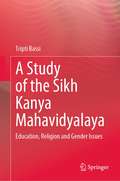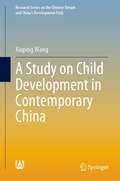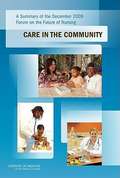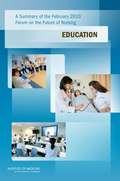- Table View
- List View
A Student's Guide to Law School: What Counts, What Helps, and What Matters (Chicago Guides To Academic Life Ser.)
by Andrew B. AyersLaw school can be a joyous, soul-transforming challenge that leads to a rewarding career. It can also be an exhausting, self-limiting trap. It all depends on making smart decisions. When every advantage counts, A Student’s Guide to Law School is like having a personal mentor available at every turn. As a recent graduate and an appellate lawyer, Andrew Ayers knows how high the stakes are—he’s been there, and not only did he survive the experience, he graduated first in his class. In A Student’s Guide to Law School he shares invaluable insight on what it takes to make a successful law school journey. Originating in notes Ayers jotted down while commuting to his first clerkship with then-Judge Sonia Sotomayor, and refined throughout his first years as a lawyer, A Student’s Guide to Law School offers a unique balance of insider’s knowledge and professional advice. Organized in four parts, the first part looks at tests and grades, explaining what’s expected and exploring the seven choices students must make on exam day. The second part discusses the skills needed to be a successful law student, giving the reader easy-to-use tools to analyze legal materials and construct clear arguments. The third part contains advice on how to use studying, class work, and note-taking to find your best path. Finally, Ayers closes with a look beyond the classroom, showing students how the choices they make in law school will affect their career—and even determine the kind of lawyer they become. The first law school guide written by a recent top-ranked graduate, A Student’s Guide to Law School is relentlessly practical and thoroughly relevant to the law school experience of today’s students. With the tools and advice Ayers shares here, students can make the most of their investment in law school, and turn their valuable learning experiences into a meaningful career.
A Student's Guide to Liberal Learning: Liberal Learning Guide (ISI Guides to the Major Disciplines)
by James V. SchallA Georgetown professor&’s look at the subjects one needs to study for a truly well-rounded education. A Student&’s Guide to Liberal Learning is an inviting conversation with a learned scholar about the content of an authentic liberal arts education. It surveys ideas and books central to the tradition of humanistic education that has fundamentally shaped our country and our civilization. This accessible volume argues for an order and integration of knowledge so that meaning might be restored to the haphazard approach to study currently dominating higher education. Freshly conveying the excitement of learning from the acknowledged masters of intellectual life, this guide is also an excellent blueprint for building one&’s own library of books that matter.
A Student's Guide to Literature: Literature Guide (ISI Guides to the Major Disciplines)
by R.V. YoungExplore the works of Western literature that have stood the test of time—and discover titles to enrich your own book collection.A Student&’s Guide to Literature takes up these questions: In a time of mass culture and pulp fiction, can great literature still be discerned, much less defended? Why is literature so compelling? What should we read? Literary scholar R. V. Young addresses these timely issues in this guide to Western literature and poetry. He demonstrates that literature liberates the mind from cultural and temporal provincialism by expanding our intellectual and emotional horizons. Learn how great fiction and poetry are integral to a liberal education, and visit the classic works of literature again—or for the first time.
A Student's Guide to Natural Science (ISI Guides to the Major Disciplines #8)
by Stephen M. BarrA concise introduction to scientific history and ideas, with a special emphasis on physics and astronomy. Physicist Stephen M. Barr&’s lucid Student&’s Guide to Natural Science aims to give students an understanding, in broad outline, of the nature, history, and great ideas of natural science from ancient times to the present, with a primary focus on physics. Barr begins with the contributions of the ancient Greeks, in particular the two great ideas that reality can be understood by the systematic use of reason and that phenomena have natural explanations. He goes on to discuss, among other things, the medieval roots of the scientific revolution of the seventeenth century, the role played by religion in fostering the idea of a lawful natural order, and the major breakthroughs of modern physics, including how many newer &“revolutionary&” theories are in fact related to much older ones. Throughout this thoughtful guide, Barr draws his readers&’ attention to the larger themes and trends of scientific history, including the increasing unification and &“mathematization&” of our view of the physical world that has resulted in the laws of nature appearing more and more as forming a single harmonious mathematical edifice.
A Student's Guide to Numerical Methods
by Ian H. HutchinsonThis concise, plain-language guide for senior undergraduates and graduate students aims to develop intuition, practical skills and an understanding of the framework of numerical methods for the physical sciences and engineering. It provides accessible self-contained explanations of mathematical principles, avoiding intimidating formal proofs. Worked examples and targeted exercises enable the student to master the realities of using numerical techniques for common needs such as solution of ordinary and partial differential equations, fitting experimental data, and simulation using particle and Monte Carlo methods. Topics are carefully selected and structured to build understanding, and illustrate key principles such as: accuracy, stability, order of convergence, iterative refinement, and computational effort estimation. Enrichment sections and in-depth footnotes form a springboard to more advanced material and provide additional background. Whether used for self-study, or as the basis of an accelerated introductory class, this compact textbook provides a thorough grounding in computational physics and engineering.
A Student's Guide to Philosophy: Philosophy (ISI Guides to the Major Disciplines)
by Ralph M. McInernyA powerful essay on the pursuit of wisdom, with recommendations for further reading.A Student&’s Guide to Philosophy examines these questions: Who is a philosopher? Can philosophical thought be avoided? What have philosophers written over the ages? And why should we care? In this critical essay, these and other questions are posed and answered by one of America&’s leading philosophers, Ralph McInerny of the University of Notre Dame. Schools of thought are examined with humor and verve, and the principal works of philosophers and scholars are recommended.
A Student's Guide to Placements in Health and Social Care Settings: From Theory to Practice
by Simon Williams Diana ConroySupporting students on placements in health and social care settings, this accessible guide provides a framework for understanding the theory behind successful practice as well as the critical skills needed to apply it. A Student's Guide to Placements in Health and Social Care Settings takes theory beyond the classroom and apply it to real settings, enabling students to recognise their own learning journey and develop their own distinct professional identity within a wider interprofessional context.This is a key resource for placement experience with insights from experts and advice direct from students who have already been on placement. With clear guidelines, and structured so that you can dip into different chapters as needed, it responds to the unique nature of placement opportunities and is the first line resource students should turn to.Whatever course you’re studying in the caring profession - Social Work, Health and Social Care, Youth Work, Nursing or Counselling – this is essential reading to help understand how theory can support and improve your placement experience, ensuring you get the very most out of it.
A Student's Guide to Political Philosophy (ISI Guides to the Major Disciplines)
by Harvey C. MansfieldA primer on the bedrock principles of politics from &“Harvard&’s most controversial conservative professor&” and the author of Democracy in America (Boston magazine). Behind the daily headlines on presidential races and local elections is the theory of the polity—or what the end of our politics should be. Harvard&’s Harvey C. Mansfield, one of America&’s leading political theorists, explains why our quest for the good life must address the type of government we seek to uphold. He directs our gaze to the thinkers and philosophies and classic works that have proved most influential throughout the ages.
A Student's Guide to Presentations: Making your Presentation Count (SAGE Essential Study Skills Series)
by Michael Shoolbred Barbara ChiversThis book gives readers a detailed guide to the preparation and delivery of both individual and group presentations. It will take them through all the pratcial stages necessary to complete a presentation and obtain excellent marks. Key features include: - Real life examples illustrating effective presentation techniques - Helpful tips and illustations throughout - A 10 step guide to preparing your presentation - Tips on using powerpoint - A companion website complete with a student resource centre Written in a clear and accessible style this book will be essential reading for both undergraduate and postgraduate students who have to conduct graded presentations. A companion website is available at www.sagepub.co.uk/chiversandschoolbred SAGE Study Skills are essential study guides for students of all levels. From how to write great essays and succeeding at university, to writing your undergraduate dissertation and doing postgraduate research, SAGE Study Skills help you get the best from your time at university.?
A Student's Guide to Psychology (ISI Guides to the Major Disciplines)
by Daniel RobinsonPsychology is frequently the most popular major on campus, but it can also be the most treacherous. In this guide, Daniel N. Robinson surveys the philosophical and historical roots of modern psychology and sketches the major schools and thinkers of the discipline. He also identifies those false prejudices--such as contempt for metaphysics and the notion that the mind can be reduced to the chemical processes of the brain--that so often perplex and mislead students of psychology. He ends by calling for psychology to investigate more intensively the problems of moral and civic development. Readers will find Robinson's book to be an indispensable orientation to this culturally influential field.
A Student's Guide to Religious Studies (ISI Guides to the Major Disciplines)
by D. G. HartAn exploration of the challenges of teaching and studying about religion in secular academic settings. The study of religion in American higher education is fraught with difficulties that raise important questions about the nature of faith and the purpose of advanced learning. Although religion has been foundational to some of the United States&’ most prestigious universities, religious studies is a relatively recent addition to the liberal arts curriculum. As a result, students often take courses in religion with expectations that exceed what professors can actually deliver. D. G. Hart explores the conundrums of the ambiguous position of religious studies in the academy and offers advice about the best way to approach and benefit from the teaching and study of religion in contexts often hostile to faith.
A Student's Guide to U.S. History (ISI Guides to the Major Disciplines)
by Wilfred M. McClayA lively, concise guide to the events and ideas that have shaped America over the centuries. No nation in modern history has had a more powerful sense of its own distinctiveness than the United States. Yet few Americans understand the immensely varied sources of that sense and the fascinating debates that have always swirled around our attempts to define &“America&” with greater precision. All too many have come to regard the study of their national history as tedious, just as they fail to embrace the past as something in which they must be consciously grounded. In this introduction to the study of American history, Wilfred M. McClay invites us to experience the perennial freshness and vitality of this great subject as he explores some of the enduring commitments and persistent tensions that have made America what it is.
A Student's Guide to the Core Curriculum (ISI Guides to the Major Disciplines)
by Mark C Henrie&“This slender volume explains the merits of getting an old-fashioned liberal arts education&” (The American Spectator). College students today have tremendous freedom to choose the courses they will take. With such freedom, however, students face a pressing dilemma: How can they choose well? Which courses convey the core of an authentic liberal arts education, transmitting our civilizational inheritance, and which courses are merely passing fads? From the smorgasbord of electives available, how can students achieve a coherent understanding of their world and their place in history? In a series of penetrating essays, A Student&’s Guide to the Core Curriculum explains the value of a traditional core of studies in Western civilization and then surveys eight courses available in most American universities which may be taken as electives to acquire such an education. This guide puts &“the best&” within reach of every student.
A Student's Guide to the Study of History (ISI Guides to the Major Disciplines #15)
by John LukacsA thoughtful look at the value of learning from the past: &“Nobody has done more than John Lukacs to turn the short history book into an art form&” (Antony Beevor, Toronto Globe & Mail). To study history is to learn about oneself. And to fail to grasp the importance of the past—to remain ignorant of the deeds and writing of previous generations—is to bind oneself by the passions and prejudices of the age into which one is born. John Lukacs, one of today&’s most widely published historians, explains what the study of history entails, how it has been approached over the centuries, and why it should be undertaken by today&’s students. This guide is an invitation to become a master of the historian&’s craft.
A Student's Guide to the Study of Law (ISI Guides to the Major Disciplines)
by Gerard V. BradleyA law professor&’s concise look at legal concepts, landmark cases, and the complex relationship between law and morality. In a society in which courts, and hence lawyers, have achieved extraordinary power, it is not surprising that the discipline of law is contentious and controversial. In A Student&’s Guide to the Study of Law, Gerard V. Bradley, professor of law at the University of Notre Dame Law School and an expert in the areas of constitutional law and law and religion, introduces readers to the major concepts, cases, and thinkers that have shaped American legal scholarship and history. He also helps readers better understand what, at bottom, is at stake in the different understandings of the nature of law that drive many of our national debates.
A Student's Writing Guide: How to Plan and Write Successful Essays
by Gordon TaylorAre you struggling to meet your coursework deadlines? Finding it hard to get to grips with your essay topics? Does your writing sometimes lack structure and style? Would you like to improve your grades? This text covers everything a student needs to know about writing essays and papers in the humanities and social sciences. Starting from the common difficulties students face, it gives practical examples of all the stages necessary to produce a good piece of academic work: - interpreting assignment topics - drawing on your own experience and background - reading analytically and taking efficient notes - developing your argument through introductions, middles and conclusions - evaluating and using online resources - understanding the conventions of academic culture - honing your ideas into clear, vigorous English. This book will provide you with all the tools and insights you need to write confident, convincing essays and coursework papers.
A Student-centred Sociology of Australian Education: Voices of Experience (Critical Studies of Education #13)
by Tiffany JonesThis book is based on a comparative study from 2018, of four different approaches to education, according to 2,500 Australians’ experiences of them, on a range of topics. It shows that whilst the critical approach has strong research-based support across the board, sometimes a liberal, conservative or post-modern approach may have some merit for certain outcomes. This is a book about challenging our biases and calling on ourselves to aim higher for education, than what our own pre-conceived ideas might allow. What and who is valued in education, and the social roles and identity messages learned, differ wildly from school to school. Education is most impacted by the orientation of education dominant in that context – whether conservative, liberal, critical or post-modern. These terms are often used with little practical data on the real-life schooling they entail. Who learns what in which approach? Who learns best with which approach, on which topic and why? This book provides this previously missing information. It offers holistic, detailed descriptions of conservative, liberal, critical and post-modern approaches to education broadly. It provides statistics and stories from real students on how the four approaches work practically in schools in relation to: age, gender, sexuality, social class, race, news-media, popular culture and technology. Chapters offer background information to the four perspectives, data from student participants, tutorial questions and activities, and suggestions for further reading.
A Student’s Guide to the Language of Finance: Essential Expressions for Business, Finance, and Banking Students
by Steve HartThis book focuses on improving reading comprehension by targeting the jargon, idiomatic language and academic expressions used in the business world. A Student’s Guide to the Language of Finance is a reference textbook designed to unlock the jargon of the business and finance world for international students, improving the reading comprehension and writing skill of English language learners by targeting the jargon, idiomatic language, and academic expressions employed in the business, finance, and banking fields. Covering terms not always captured in business dictionaries or workbooks, the resource also contains sections on spoken business English, key academic terms found in textbooks and journals and useful expressions to employ when writing an academic paper. It is specifically targeted at students whose first language is not English.
A Study Guide for BABY DINOSAURS ON THE ARK?
by Janet Kellogg RayIt&’s time to address the elephant in the ark. In Baby Dinosaurs on the Ark? The Bible and Modern Science and the Trouble of Making It All Fit, Janet Kellogg Ray reached out to Christians who experience cognitive dissonance between their creationist commitments and modern science. With this new study guide, she returns to her argument with fresh perspective and an eye toward practical instruction. Ray approaches her topic with empathy for her readers while maintaining scientific rigor. This discussion guide is the perfect companion for students and nonexpert readers of her book, as it includes notes, discussion questions, and lists of external resources to supplement the original. Expanded treatments of each chapter&’s topics encourage thinking with and beyond the concepts introduced in the main text.
A Study Guide for the Operator Certificate of Professional Competence (CPC) in Road Freight: A Complete Self-study Course for OCR and CILT Examinations
by Clive PidgeonA Study Guide for the Operator Certificate of Professional Competence (CPC) in Road Freight is a vital study guide that offers the thorough preparation needed to pass the tough CRC exams. This is the Level 3 standard qualification overseen by OFQUAL and the Welsh Assembly Government which is required by any person wishing to operate vehicles over 3,500kgs maximum authorised mass for hire and reward, both nationally and/or internationally. A Study Guide for the Operator Certificate of Professional Competence (CPC) in Road Freight covers the examination method used by both OCR and CILT. It covers the 8 study sections that the directive requires: civil law; commercial law; social law; fiscal law; business; financial; management of the undertaking access to the market; technical standards and technical aspects of the operation road safety.The new book has been extensively revised to make it more accessible and understandable. It features many more case studies, examples, diagrams and graphics. There are also test questions for each section.
A Study of Macao Tertiary Students’ Attitudes Towards Language After the Handover (SpringerBriefs in Education)
by Xi YanThis book focuses on the attitudes of Macao tertiary students toward language after the handover. It shares the findings of a questionnaire survey and semi-structured interviews, which were conducted among freshmen of the University of Macao to investigate their attitudes toward Cantonese, Putonghua, English, and Portuguese, as well as their attitudes toward Macao's language planning and language policy. Utilizing a multidimensional and multilayered perspective in the study, this book also demonstrates the orientations of Macao tertiary students and the correlation between their social categories (gender and social class) and their attitudes toward language.
A Study of the Sikh Kanya Mahavidyalaya: Education, Religion and Gender Issues
by Tripti BassiThis book addresses the issue of Sikh women’s education in Punjab within the larger discourse of women’s education in India. It focuses on the role of the Sikh Kanya Mahavidyalaya (SKM)—one of the most important educational institutions established in the nineteenth century as a result of the Sikh reformist movement in Punjab. It explores how various dimensions of caste, class, gender and religion generate a variety of approaches to the culture of literacy, and takes a closer look at the relevance of the Sikh Kanya Mahavidyalaya in today’s India and its contribution to the area of educational pedagogy. It focuses on gender in education, specifically discourses and practices in women’s education. In addition to providing valuable insights and critical evidence that can be used in the planning and implementation of education and gender policies, the book is sure to spark conversations in courses and professional communities interested in education, gender studies, history, sociology as well as overlooked dimensions of gender history.
A Study on Child Development in Contemporary China (Research Series on the Chinese Dream and China’s Development Path)
by Xiuping WangThis book is devoted to the description and analysis of child population, rights to survival and development, culture and policies that Chinese government made in contemporary China. The book pursues three major objectives: firstly, to objectively describe child development in contemporary China ; secondly, to analyze characteristics of child development in contemporary China; and thirdly, to review all types of policies Chinese government has made on children survival, protection and development, which played important roles on promoting child development.
A Summary of the December 2009 Forum on the Future of Nursing: Care in the Community
by Institute of Medicine of the National AcademiesThe Robert Wood Johnson Foundation Initiative on the Future of Nursing, at the IOM, seeks to build a blueprint for the future of nursing as part of larger efforts to reform the health care system. The second of the Initiative's three forums was held on December 3, 2009, and examined care in the community, focusing on community health, public health, primary care, and long-term care.
A Summary of the February 2010 Forum on the Future of Nursing: Education
by Institute of Medicine of the National AcademiesAs the U.S. health care system continues to evolve, the role of nurses also needs to evolve. Nurses must strike a delicate balance among advancing science, translating and applying research, and caring for individuals and families across all settings. Preparing nurses to achieve this balance is a significant challenge. The education system should ensure that nurses have the intellectual capacity, human responsiveness, flexibility, and leadership skills to provide care and promote health whenever and wherever needed. Education leaders and faculty need to prepare nurses with the competencies they need now and in the future. They need to prepare nurses to work and assume leadership roles not just in hospitals, but in communities, clinics, homes, and everywhere else nurses are needed. On February 22, 2010 the Initiative on the Future of Nursing held the last public forum in a series of three at the University of Texas MD Anderson Cancer Center. This forum, which covered the education of nurses, consisted of three armchair discussions. Each discussion was led by a moderator from the committee and focused on three broad, overlapping subjects: what to teach, how to teach, and where to teach. The verbal exchange among the discussants and moderators, prompted by additional questions from committee members at the forum, produced a wide-ranging and informative examination of questions that are critical to the future of nursing education. Additionally, testimony presented by 12 individuals and comments made by members of the audience during an open microphone session provided the committee with valuable input from a range of perspectives.
